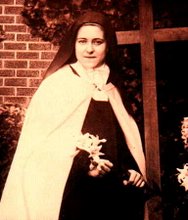 The oldest of seven children, --and here's his whole name-- Alphonsus Mary Antony John Cosmas Damian Michael Gaspard de' Liguori(1696-1787), was very bright (not bright so that he had to wear sunglasses, but because he had bad eyesight and wore glasses), high-spirited, and responsible even as a child. He had great progress in all kinds of learning, from fencing to riding, and even an evening game of cards. He was also quite fond and did well at music, as his father made him practice the harpsichord three hours a day. By the time he was 13 years old, he had already reached the perfection of a master of the harpsichord. He wasn't sent to school, rather, his father kept watch on him when he had tutors give him excellent education. (So in a way you could say he was homeschooled too! :-D jk) Alphonsus never liked theaters (he even refused to take part in a play!) so when there would be an opera to attend, he would remove his glasses to enjoy the music more!
The oldest of seven children, --and here's his whole name-- Alphonsus Mary Antony John Cosmas Damian Michael Gaspard de' Liguori(1696-1787), was very bright (not bright so that he had to wear sunglasses, but because he had bad eyesight and wore glasses), high-spirited, and responsible even as a child. He had great progress in all kinds of learning, from fencing to riding, and even an evening game of cards. He was also quite fond and did well at music, as his father made him practice the harpsichord three hours a day. By the time he was 13 years old, he had already reached the perfection of a master of the harpsichord. He wasn't sent to school, rather, his father kept watch on him when he had tutors give him excellent education. (So in a way you could say he was homeschooled too! :-D jk) Alphonsus never liked theaters (he even refused to take part in a play!) so when there would be an opera to attend, he would remove his glasses to enjoy the music more!
At the age of sixteen he took his degree as Doctor of Laws. Alphonsus even said himself that he was small at that times, so much that he was almost buried in his doctor's uniform, and all the onlookers laughed. For about eight years he worked as an advocate, and is said to have never lost a case (except until later). But before attending court he always attended Mass first.
By the time he was around 26 years old, he began to enjoy what the world had to offer for him. Constantly, he would go into society. He put aside prayer and other things as he began to take pleasure in his popularity and the attention he would receive everywhere. "Banquets, entertainments, theatres," he later wrote, "these are the pleasures of the world, but pleasures which are filled with the bitterness of gall and sharp thorns. Believe me who have experienced it, and now weep over it." And later, he began to have the feeling that the more he learned more of the world, he liked it more less. And finally in the year 1723 it seemed as if God had taken him on the road where St. Paul had been... on the way to Damascus.
As one of the leading counsel in court, Alphonsus had made a brilliant speech that was sure to bring victory to his side. As he sat down with much confidence that he had already won, the opposing counsel rebuked him ever so harshly saying that he had overlooked a document holding evidence that they were right and he was wrong. As the future saint took hold of the document, he reread the document that he knew that he had read so many times he began to be somewhat flabbergasted, as if he finally realized some part in it. With trembling hands he finished, and he replied in a sad, broken voice that they have indeed won the case. All those around him, and even the judge, had attempted to console him, but they all unsuccessfully had done so. It was as if by just that one case he had lost, Alphonsus's once high-spirit had been broken down. He knew in despair and humiliation that his career had ended by that one mistake he had made. As he left the court he said in a quiet voice, "World, I know you now. Courts, you shall never see me more." Feeling crushed to the ground in complete misery, he refused food for three days.
But just as St. Paul too, had recovered of his blindness, Alphonsus began to see the light shortly after as well. He began to understand why God had allowed that previous event; to break down his pride and tear him away from the worldly life he was living. Feeling as if a new hope had risen within him, he started praying ever so sincerely to find what God had wanted of him. Alphonsus never returned to his profession, but instead of standing in court, he stood in the hospital doing simple acts of charity to those who had incurable illnesses.
At two points in time during his visits, (in that same year) he felt as if the house was shaking and saw that he was surrounded by a mysterious light. "Leave the world and give thyself to Me," An interior voice said to him. After it had all ended, he left the hospital right away went to the church of the Redemption, his once broken down spirit now rising high again. When he had reached the church he laid his sword before the statue of Our Lady, and solemnly vowed to enter the religious life and even to offer himself as a novice to the Fathers of the Oratory. As he went home back to his house, it suddenly came to him that the rest wouldn't easy. (especially telling his father) But he also knew in his heart that if God had taken him this far in his vocation, wouldn't He help him in the later years to come? Surely God wouldn't drop him off like from a car just like that!
Alphonsus's father was indeed upset at his decision, but for two reasons: he had already arranged a marriage for this future saint, and even more depressed that his son had given up his excellent career as an advocate. For two months Alphonsus was scolded by his father for having given up his once 'excellent' life. But just as St. Paul endured persecution for his faith, Alphonsus waited patiently for his father's approval. But needless to say, his father gave in anyway... but under but only if he would let go of his promise to join the Oratory, and just become a priest and live at home. After also receiving his director's approval, Alphonsus agreed. And because of his free time, he was able to work on what he would soon be able to do: found a new religious order.
Still in that same year, 1723, the ecstatic future saint put on the clerical dress and almost a year later, he joined the association of missionary secular priests (called the Neapolitan Propaganda) and received the tonsure shortly after. It was as if he had once again regained his high-spirit disposition; his joyful heart was now soaring. In the next couple of years he received minor orders and the subdiaconate. Then around the middle of the year 1726, he was ordained deacon. Alphonsus rejoiced as he finally found his vocation; what he was really called to. And just before Christmas of that same year, the 21st of December, he was ordained a priest.
"God says to each of us: 'Give me your heart, that is, your will.' We, in turn, cannot offer anything more precious than to say: "Lord, take possession of us; we give our whole will to you; make us understand what it is that you desire of us, and we will perform it."
If we would give full satisfaction to the heart of God, we must bring our own will in everything into conformity with his; and not only into conformity, but into uniformity also, as regards all that God ordains. Confirmity signifies the joining of our own will to the will of God; but uniformity signifies, further, our mkaing of the divine and our own will one will only, so that we desire nothing but what God desires, and his will becomes ours. This is the sum and substance of that perfection to which we ought to be ever aspiring; this is what must be the aim of all we do, and of all our desires, meditations and prayers. For this we must invoke the assistance of all our patron saints and our guardian angels, and, above all, of our divine mother Mary, who was the most perfect saint, because she embraced most perfectly the divine will."
- Saint Alphonsus Liguori, from The Redeeming Love of Christ
O holy and heavenly Infant, Thou who art the destined Mother of my Redeemer and the great Mediatress of miserable sinners, pity me. Behold at thy feet another ungrateful sinner who has recourse to thee and asks thy compassion. It is true, that for my ingratitude to God and to thee, I deserve that God and thou should abandon me; but I have heard, and believe it to be so (knowing the greatness of thy mercy), that thou dost not refuse to help any one who recommends himself to thee with confidence. O most exalted creature in the world! Since this is the case, and since there is no one but God above thee, so that compared with thee the greatest Saints of heaven are little; O Saint of Saints, O Mary! Abyss of charity, and full of grace, succour a miserable creature who by his own fault has lost the divine favour. I know that thou art so dear to God that He denies thee nothing. I know also that thy pleasure is to use thy greatness for the relief of miserable sinners. Ah, then, show how great is the favour that thou enjoyest with God, by obtaining me a divine light and flame so powerful that I may be changed from a sinner into a Saint; and detaching myself from every earthly affection, divine love may be enkindled in me. Do this, O Lady, for thou canst do it. Do it for the love of God, who has made thee so great, so powerful, and so compassionate. This is my hope. Amen.













2 comments:
One of my fav. saints!! Nice post dear girl.
Ha ha... Thanks! :-D
Post a Comment